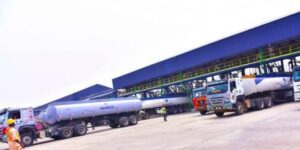Nigeria needs more than oil production cuts to save itself
Crude oil producers under OPEC and its partners, OPEC+, got into a head-on collision with governments around the world trying to tame inflation, which has been triggered by high energy prices as OPEC+ agreed to a 2 million BPD cut.
The reduction would mean eight countries reduce actual production and achieve the real cut of only 880,000 barrels a day, according to calculations based on September output figures.
OPEC members had expressed worries that the global economy is slowing down quickly in the face of quickly tightening monetary policy, which they say would be reflected in a larger-than-expected drop.
The market adjusted immediately to the output cut as Brent Crude continued its climb towards $100, to $97.90 a barrel by Sunday, a welcome relief for all major Crude Oil producers, except Nigeria.
However, the past month has been one of the worst periods in Nigerian Crude oil production, if not the worst in Nigerian crude oil production history.
Last month it was announced that Nigeria’s daily crude oil production fell below 1 million barrels per day (BPD) for the month of August to 972,394 BPD, which was below Angola’s average daily output of 1.17 million barrels.
The Nigerian Upstream Petroleum Regulatory Commission report cited that Nigeria’s monthly average was 972,394, compared to 1,03,899 for the previous month.
Nigeria’s problems, got even worse, when Mele Kyari, the CEO of NNPC Ltd, told Nigerian Lawmakers in a press briefing on crude oil theft that it has so far shut down the operations of 395 illegal refineries.
He also revealed that an illegal connection of four kilometers route into the sea running from its major Forcados line, which he estimates has been around for nine years, citing that crude theft by vandals reduced Nigeria’s oil production to around 1.2 million barrels per day from 1.8 million.
Kyari warned, “To be very precise, we have never seen this level of escalations in our operations.
“The scale of oil theft, vandals that we are seeing today is unprecedented, prices of crude oil are so high in the market today, for oil thieves to operate.
“But we have put a structure of security hovering around our partners, all the government security agencies, we have set up private contractor security.
“The Brass, Forcados, and the Bonny terminals, are all practically doing zero production today; the combined effect is that you have lost 600,000 barrels per day when you do a reality test.
“But we hope to restore production to the Forcados terminal; this is as a result of the security intervention that is ongoing,” he said.
Vandalism has been a problem for businesses in the Niger Delta for a long time. The 180,000 barrel-per-day Trans-Niger Pipeline running dry exemplifies the severity. According to an industry union, utilization between October 2021 and February was as low as 5 per cent.
This has roughly affected Nigeria’s production to the tune of 600,000 BPD as Forcados, Bonny, and Brass have all been shut down as a result of crude oil theft.
Gbenga Komolafe, the Chairman of the Nigerian Upstream Petroleum Regulatory Commission, added that only roughly 132 million barrels of the 141 million barrels of oil produced in the first quarter of 2022 were received at export terminals.



